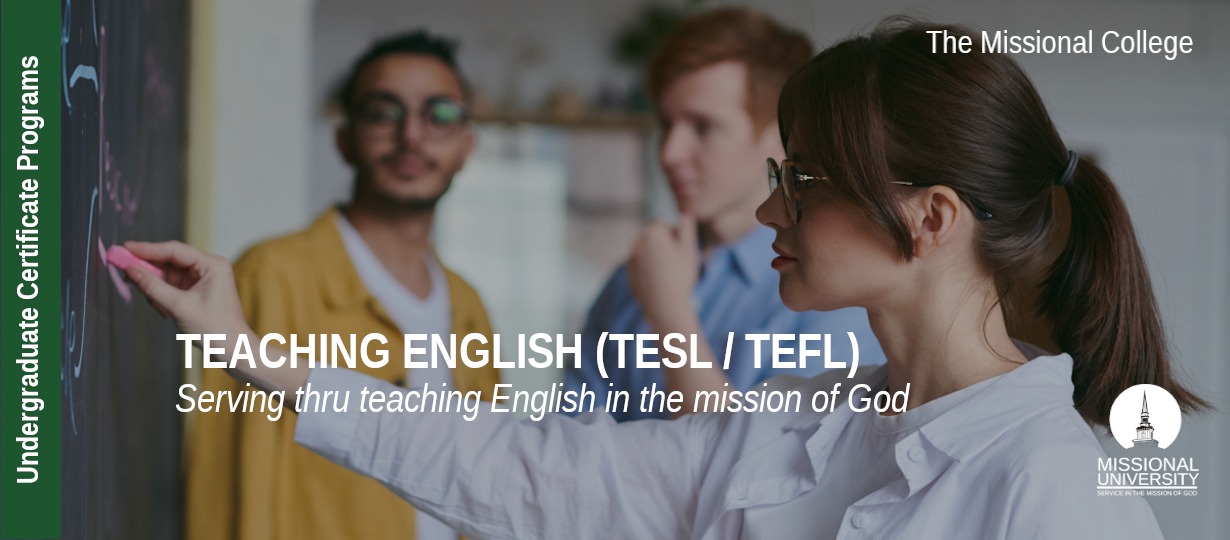
Online Undergraduate Certificate Program in
Teaching English (TESL/TEFL)
School: Missional College // Study Area: Serving Among Cultural Differences
☩ Same as Other Universities, But with Missional Integration
Expand Your Intercultural Abilities Today!
REQUEST INFORMATION
Ready to learn more about the
Undergraduate Certificate in
Teaching English (TESL/TEFL)?
LEARN MORE NOW
The Undergraduate Certificate in Teaching English (TESL/TEFL) provide students with the knowledge and skills to teach English to speakers of other languages (TESOL), to students for which English is a second language (TESL), and to teach English as a foreign language (usually in a country that is not predominantly English-speakin) (TEFL). Through the certificate program, students gain the following capabilities:
-
- ability to articulate the sweeping narrative of God's story of global redemption throughout the Old and New Testament
- ability to observe and evaluate the teaching of English in its global, social, economic, personal and cultural contexts
- ability to articulate and apply key concepts and principles to the study of the nature and structure of language including phonetics, phonology, morphology, syntax, semantics, and pragmatics
- ability to develop listening and speaking skills whereby the student integrates language skills with living, social, academic and professional skills from an intercultural perspective
- ability to develop practical reading and writing skills and integrate those skills with practical language skills
- ability to create TESOL materials through collecting and organizing authentic linguistic and cultural data and developing TESOL curriculum by planning lessons and designing communicative tasks.
You don't have to travel abroad to teach English; there are plenty of immigrants who need help learning the English language. You may have opportunities to teach English as a second language (ESL) at a public school, community college, community center, church, library, corporation or for a private group. But you may also teach English in another country where you will experiece another culture and see the world in a way no tourist can. it’s a chance to do something wonderful and adventurous that will change your life forever. Teaching abroad captures what international exchange is all about. It’s people from very different cultures coming together, learning from one another, and making positive connections. It’s a way to travel, gain work experience, and do good all at the same time. It's an amazing chance to change lives for the better. Helping young students learn English opens doors to new opportunities for them. And helping adult learners enables them to communicate with English-speaking relatives and become more competitive in the global economy. Many faith-based organizations offer opportunities to serve abroad teaching English.
Program Features
-
Integrated practicums allow you to gain valuable real-world experience
-
Learn from academic practitioners from around the world
-
Credits earned in this certificate program can apply to a Missional University Bachelor completion program
Course Effort
Course Length
Credits Required
Program Cost
What Will I Study?
We offer the most comprehensive approach to serving thru Teaching English in the mission of God.
Examines the biblical theological foundations of God's plan for global redemption throughout the Old and New Testament. The student will explore the eternal purpose of God for humanity, the state of those who have not heard the gospel, and the application of the missional mandate to various cultures.
This course surveys the status and implications of English as an international language and the teaching of English in its global, social, economic, personal and cultural contexts. Students will have opportunities to observe and report on case studies of English language teaching in both formal school and informal personal environments, drawing out principles/skills applicable in using English as a language of mission whether in formal teaching or informal coaching situation. They will also engage in field trips to visit local church-based immigrants and refugees ESL ministries and interview missionaries who have taught English as a mission in the global context. Particular attention will be given to the effective use of English as a language of love to engage, encourage and empower.
Language is a unique gift from God to create meaning and conduct communication. This course introduces key concepts and principles in the study of the nature and structure of language. The first part introduces phonetics (the articulation of sounds), phonology (the structure of sounds), morphology (the structure of words), and syntax (the structure of sentences). The second part examines semantics (the structure of meaning) and pragmatics (the structure of communication). Students will design a poster to map a concept or a principle of their choice. They will then present the topic to the class. They will also find a new language unknown to themselves to analyze its basic elements at the sound, word and sentence levels. The focus will be on the understanding on the highly structured, creative and relational nature of language.
This course examines in details the practices of developing listening and speaking skills. The emphasis is on the application of multiple intelligence and the development of learner autonomy. It surveys the practices of integrating language skills with living, social, academic and professional skills as well as the development of international identity and intercultural perspective in the learning and teaching of English language. A theme unit will be designed by the class working together as a group as part of the course to organize content and project-based teaching. Students will have the opportunity to observe classroom teaching and take their design to teach in a real classroom situation.
This course examines in details the practices of developing reading, writing skills and structural understanding. The emphasis is on the application of multiple intelligence and the development of learner autonomy. It surveys the practices of integrating language skills with living, social, academic and professional skills as well as the development of international identity and intercultural perspective in the learning and teaching of English language. A theme unit will be designed by the class working together as a group as part of the course to organize content and project-based teaching. Students will have the opportunity to observe classroom teaching and take their design to teach in a real classroom situation.
This course reviews the principles and practices of TESOL curriculum process. Emphasis is on creating TESOL materials portfolio through collecting and organizing authentic linguistic and cultural data and developing TESOL curriculum by planning lessons and designing communicative tasks. Students will design an English teaching module with 20 hours of teaching materials selected from authentic language and cultural data well designed into communicative teaching activities and learning tasks. Students will choose the theme of their module according to their interests, background knowledge and life experience. They will be encouraged to use online materials relevant and suggestive to language and cultural learning to design online lessons that will address the development of listening, speaking, reading and writing skills as well as grammar and cultural knowledge. Finally the course will survey current models of TESOL program administration and supervision in order to prepare students to design, deliver and develop quality TESOL programs.
Optional Additional Electives
Language is a unique gift from God to create meaning and conduct communication. This course introduces key concepts and principles in the study of the social functions and context of language. We will focus on how language is relational and how meaning is produced, maintained, negotiated, manipulated and changed in the dynamics of social relationships. Students will design a poster to map a concept or a principle of their choice. They will then present the topic to the class. Students will also present a case study of language learning or teaching in the rich social contexts of meaning negotiation.
Introduction to the highly relational nature of culture and language development. Students will explore principles and skills from observing children in a native acquisition environment and will apply the principles and skills to learning a second language/culture. Attention to formation and shifting of attitude and identity, critical period and giftedness, relationships between linguistic, mental, emotional, social and cultural learning.
Introduces teachers to the current and major theories of language acquisition, and the “ how “ in relationship to the theory application to the instruction of ESL students. The course content will include introductory aspects to the methodology in teaching reading and writing Standard English and the practical usage of grammar, mechanics, vocabulary, punctuation, spelling syntax related to the oral and written production of Standard English.
Investigation of the relationship between language, thought, and belief systems. The course also examines a wide variety of cultures and evaluates how languages shape thought patterns and everyday communications.
When Can I Get Started?
We offer multiple start dates each year to give you flexibility in your education, life and work schedules.
JANUARY
MARCH
MAY
AUGUST
OCTOBER
A Career in Navigating Cultural Difference
Is this Your Mission?
Academic ESL Instructor, Adult ESL Instructor, Adult ESL Teacher, Director of International Programs, English/ESL/TESOL Instructor, English as a Second Language Instructor, English As A Second Language Teacher, English as a Second Language Teacher Online, English Language Learners Teacher, English Language Trainer, English Tutor, Enterprise ESL Teacher, ESL Instructor, ESl Teacher, ESL Teacher for Children, ESL Teacher Online, ESOL Instructor, ESL/TEFL English Instructor, In- School English Language Learner Tutor, Instructor-English Language Acquisition, Intensive English Program (IEP) Instructor, International English Language Teacher, International ESL Teacher, Online ESL Second Language Tutor, Online Language Tutor, Online English Teacher, Online English Teacher / Tutor, Online English as a Second Language Tutor, Sr. Development Editor, TESOL Instructor, TESOL Teacher, Youth Program Specialist
Request Information Now
How Much Will it Cost?
We offer tuition based upon country of residence. According to the Human Development Index, all countries around the world fall into one of four categories:
-
(Tier 1) - Very High Human Development
-
(Tier 2) High Human Development
-
(Tier 3) Medium Human Development
-
(Tier 4) Low Human Development
Our tiered global tuition makes higher education affordable for everyone world wide.

TIER COUNTRIES
100% Tuition
$295
per credit hour
3 credit course
$885

TIER COUNTRIES
80% Tuition
$236
per credit hour
3 credit course
$708

TIER COUNTRIES
60% Tuition
$177
per credit hour
3 credit course
$531

TIER COUNTRIES
40% Tuition
$118
per credit hour
3 credit course
$354
Tiered tuition based on country of origin and scholarships available. Find your country of residence here for more information.
Tuition may be further reduced by participating in the Sponsorship Program.
